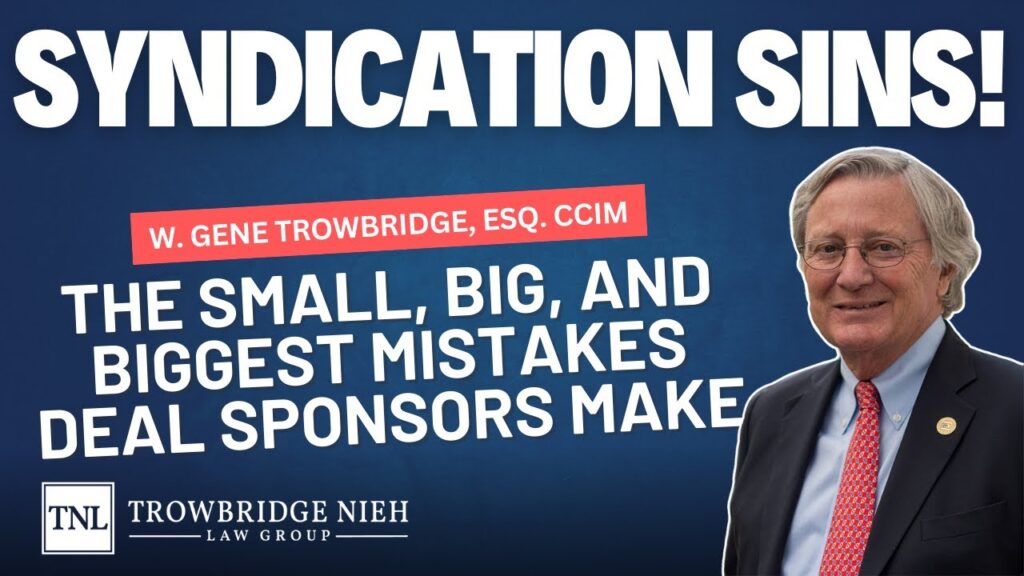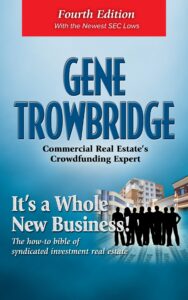The What, Why, and Potential Changes
In this episode of TBD with TLG, syndication attorneys Gene Trowbridge and Jonathan Nieh discuss accredited investors and the potential legal changes that may affect accredited investors in the future.
Transcription:
 | JN | - Hi, everybody. Welcome to another installment of the "TBD with TLG Podcast." Your host, Jonathan Nieh and my partner, Gene Trowbridge. |
 | GT | - Hey Jonathan, how are you? |
 | JN | - I'm doing great, Gene. How are you doing? |
 | GT | - Good. Good to see you. Thank you. This is always exciting because it's kinda TBD. So I hope we're on the same page with what we're talking about but we'll see. |
 | JN | - Well, what are we talking about Gene? |
 | GT | - Let's do it Jonathan. Take it away. |
 | JN | - Well, I guess I got to decide right now it's to be determined, right? So I'm determining the topic. So our topic this week is what is an accredited investor? Why is there an accredited investor definition? And I guess there's been some proposed changes to that definition. So yeah, let's talk about accredited investors, Gene. |
 | GT | - Okay. Let's do that. Way back when, when the securities laws were passed, the government realized that they couldn't regulate everyone who was selling a security and they couldn't regulate every security. There just wasn't time, manpower enough money. So they said, you know, there's a whole bunch of investors who really don't need our protection and they kinda loosely used the words rich people, smart people, and they called them accredited investors. And it went along for a long way that we really didn't know, we really didn't know what accredited investors were but in 1981, the law changed and Regulation D under which most of our deals are done, aren't they Jonathan? |
 | JN | - Yep. |
 | GT | - Regulation D 506 or or was modified and they put into, basically the law if you would, a definition of accredited investors, still with the same purpose that, hey, these rich and smart people don't really need our protection. So Regulation D had been around for a while and sponsors could raise money from rich and smart people but no one knew exactly what that was. And, you know, I was raising money at that time and this Regulation D rule change came along, and all of a sudden I knew and it made me feel good and did the broker dealers I was working with at the time, helping me raise money. We all now knew what it stood for and they came out with a dollar and cent definition of accredited investors. And what they said is if you were an individual taxpayer and you made, you had a net worth of more than a million dollars, you were rich. You didn't need protection. Now, not everyone had that net worth and you've got to think, that was 1981 when a million dollars was something. So they said, well there are some people who may not have that net worth but they have substantial earnings and they don't need our protection. So they came along and said, okay if you're an individual taxpayer filing single tax return, it's $200,000 for this year and probably the last two years and you can reasonably expect that to continue. So that would be top-line on your income tax return. If your income was over $200,000, you are gonna be accredited. And a couple, married, filing jointly could use both of their incomes combined. and if it hits 300,000 for the total return, they would be accredited. So it's been that rule forever and ever and ever. One million or 200,000 or 300,000. And then the Dodd-Frank rules came along after the 2008 debacle and Dodd-Frank said, you know, we've got some people that may have a net worth of over a million dollars but maybe they really do need our protection. And an example, I'm out here, Jonathan and I right now are living in California, there were a lot of people who bought their houses in the 60s, ocean front for 100,000 bucks. And you know, by 2008 their houses are worth 2 million dollars, free and clear and the people are living there on social security. Dodd-Frank said that's not right. Those people need to be protected. So the major change that I've seen since I've been in the business since 1981 is the elimination of your equity in your primary residence from the calculation of a million dollar net worth. So it's gotta be a million dollars, not including your house at all. And in fact, if you're, it really doesn't apply much today, but there are times when your mortgage on a house may have been more than the house was worth. That extra bit of the mortgage was actually counted against your other net worth. So if I'm a renter and I have a million dollars in the bank, I'm accredited. If that's my net worth, I have no bills, I'm accredited, right? If I'm a single taxpayer and I make $200,000 a year, whether I own a house or not is irrelevant because the house isn't part of the annual income approach. And the same with married filing jointly. So one of the things we've found over time is that this million dollars can be problematic. We have some syndicators who are doctors and only bring offerings to the marketplace that doctors invest in and in today's world, the value of someone's medical practice is difficult to determine. So we don't even use the million dollar net worth requirement. We go right to annual income and that works. So in wrapping this part up, rich and smart people by design don't need the protection of the government. They started out just letting sponsors decide who's rich and smart, who's accredited. In '81 they came out with the million, 200 and $300,000 test. In 2008, 2009, they came out with Dodd-Frank and said take your home out of there. So that's where we are with accredited investors. But hold on, Jonathan may have some new information for us at the end. And the other thing that happened is that there are entities that invest. In fact, in the definition of accredited investors, Jonathan, I think they're 15 or 16 definitions of accredited investors like a bank and a savings and loan and everything that's FDIC insured, all that stuff which we don't really worry about. But what about a family office? What about a family partnership? What about a group of people that just get together and invest? Well, the rule there is, is if that entity has $5 million worth of net worth and wasn't formed just to make an investment in this wealth for $5 million, qualifies them as accredited. So I run a family office. We've been in business for 20 years. We have $10 million. You come to me and you want me to invest in your deal which is only for accredited investors. I can invest no matter if I've got minors or juveniles in family office, it doesn't make any difference. Forget about the individuals. The family office has more than $5 million net worth is accredited. But what if I just put together five guys with a million dollars each and we want to go into more deal, but you're only gonna do accredited? We all want to invest together. Let's say your minimum investment is a million dollars. Okay. We put together our group, we come to you and say, "Hey, we want to invest. We've had $5 million of net worth." Because that group is formed just to invest in your deal, you'd have to go through the group to each investor. And let's change the example. If all five are accredited, you wouldn't have a problem. But if four are accredited and one is non-accredited or just sophisticated, you can't take that group as a group. You could take the four individuals who have the million dollars in net worth, but you can't take the other person. So if the entity's been formed and is in existence and has over $5 million of net worth accredited, take it. If it's just been formed to do your investment, you're gonna have to go through and look at each individual investor and see if they can, they can invest with you. Now, you might have an offering that isn't limited to just accredited investors. Maybe you'll take accredited and sophisticated. So in my example, with four people that are accredited, one person that's sophisticated, you can take them all as individuals but that one person counts towards your 35 limit. So that's what we know about accredited investors up until now. And Jonathan, how do we use that in our offerings? How does this come about when we're doing our Reg D offerings? |
 | JN | - Yes. So I mean, it's in the rules themselves, right? So if you're doing 506 offering, you can take an unlimited number of accredited investors and up to 35 sophisticated investors. We're not gonna really talk about sophisticated investors today but 506 , you can't advertise so you have to have a pre-existing relationship with all of your investors. If you're doing a 506 offering, you can advertise. You could generally solicit, but all of your investors have to be accredited and you have to take steps to verify their status. So for like a individual that's accredited based on their income, you have to look at their, W2's or tax returns for the last two years to make sure that they had enough income for those years. For someone net worth, if you're ever in their net worth you have to look at their assets and then you also have to get like a credit report from them to verify their liabilities to make sure that their net worth, their net worth is over a million dollars. I actually used to verify accredited investors at my old job before joining this firm. So I kind of know a little bit about the process of verifying investors. |
 | GT | - Well, that process, Jonathan scared the hell out of me when I was a syndicator. I really didn't wanna ask an investor for their tax return. I didn't wanna ask an investor for, a certified financial statement 'cause who the hell has that? So it was really, it was really burdensome. And it's funny, you know, you go down to the bank, Jonathan, you wanna buy a $20,000 car and there's a 20 year old, 22 year old banker sitting there who's gonna ask you for a stack of papers this big, and isn't bashful about asking you for all your financial records. But now I'm a syndicator and I'm gonna take 100,000 dollars from an investor and I don't wanna ask for their K1 or their 1099 for the last few years. Crazy. But sponsoring a tough, tough situation. |
 | JN | - Yeah. Yeah. I mean, I got push back a lot when I was asking investors for their tax returns to verify their net worth. |
 | GT | - Cause that's because the rule was new, right? |
 | JN | - Yep. Yep. But I think now it's, I mean, 506 , not many people are using, right? The majority of people are raising money under 506 and I think one of the reasons is this, this extra hurdle they have to go through verifying investors, right? The sponsors don't wanna do it and a lot of times even now the investors don't even wanna provide those documents, so. |
 | GT | - Yeah. I've had people, I've had clients who've come to me and said I'd like to do a 506 and I said fine, you need everyone to do this. And they say, well I've got previous investors who've invested with me. Why do I need to deal with that? Cause that's kind of the rule. And so the new, the investors who've been used to in a 506 right, check the box because in 506 you can self-certify. Is that right? |
 | JN | - Yeah. Well, as long as you have that pre-existing relationship and you know- |
 | GT | - Yeah. Self-certify. But 506 you can't and so a lot of sponsors don't wanna ask their good repeat investors to go through all this. What are some of the sponsors doing who are going through 506 Jonathan, to overcome their personal responsibility of doing this? |
 | JN | - Yeah. So one of the, I guess, safe harbors for verifying that someone is accredited is you can rely on a third-party letter. So you could tell the investor to go out and get their CPA or attorney to sign this letter basically saying that they verified it. But another easier way of doing it is just sending the investor to a website that'll do the verification for you. So there's a bunch of websites out there that provide those services. You pay, like I don't know, 40, 50 bucks an investor and they go on the website and they upload their documents to the website and then they take care of the verification and then they give you the the letter basically saying that this person is accredited. |
 | GT | - So you can find that by Googling, right? Find companies just by Google that and then you'll get a letter, as a sponsor, you'll get a letter that says Gene Trowbridge is accredited. Okay. That letter is good for 90 days. So you may have to do that over and over and over with the same investor if you're doing a 506 . But the second and third time couldn't be quite as complicated as the first time. That's what's happening. |
 | JN | - Yeah. So, I mean, there's been a lot of pushback on the definition of a credit investor, right? A lot of our clients and a lot of people industry think it's too restrictive, that they should open up the definition to more people to allow more people to invest and SEC they listen and last year they actually came out with some proposed changes, I think in December and you know how the SEC rule-making works is they come up with proposed changes and they open it up to public comment. They get comments from the public and then they issue the final rules. So right now I think they're in the process of gathering comments still, but we have an idea of where they're going because they released these proposed rules back in December. So let's talk about some of these changes, Gene. So the first one, the first proposed change that they're gonna do to credit investors is kind of open new categories for an individual to qualify, right? So before, an individual can only be a credit wrestler based on their income or their net worth. Now they want to open it to I guess, professional destinations so if you have a license to sell securities, if you have like a Series 7 or a Series 65, that could qualify you as an accredited investor. And I guess the logic behind it is you already went through all this education to get that license. You don't really need to be protected from these, more risky investments. |
 | GT | - Plus you're already giving advice to other people. |
 | JN | - Yeah. |
 | GT | - You're telling other people whether the investments are suitable for them or not so that really makes some a little self-serving, isn't it, for the SEC say that all of our members who pay dues to us and get our licenses are now accredited. Okay. Fine. That's just the cynic in me but we're trying to promote capital formation, right? You set up the ability for capital formation, that's good. What else? |
 | JN | - So another, I guess, couple licenses that could qualify. I think they talked about allowing people with a CPA or a CFA or MBA to qualify as a credit investor. How do you feel about that, Gene? |
 | GT | - Well, it depends on what the MBA is in. I bet when the comments are done they're gonna come back and say well, better be in financing or something like that. I don't know. It could be an MBA in marketing. |
 | GT | - So that's fine. And then is it gonna be restricted to certain colleges? |
 | JN | - Yeah. That's a good point. |
 | GT | - Is it gonna be just online or just live or if you're from the University of Chicago and you get an MBA, I bet you're qualified. But I don't know if you're from some other, some other place . |
 | JN | - University of Phoenix. |
 | GT | - There's nothing wrong with University of Phoenix. I think they're good for that right now. But I think that there is, there is a grade there. |
 | JN | - Yeah. Okay. So another proposed change is adding the knowledgeable employee definition to a private fund. So previously, if you are a private fund, one of the definitions of a credit investor is if you're an officer or director of the private fund you count as an accredit investor for the purpose of the fund, right? You can invest in the fund because your officer or director of that fund is your credit investor. But they wanna add another category to that sub category of, you're not an officer or director, but you're a knowledgeable employee and it's not really clear exactly what that means. Like how much knowledge do you need as the employee. But I don't know. I thought that's kinda interesting. |
 | GT | - One of the examples I heard at the conference that we go to in Scottsdale every year that talks about this, one year I went by myself and one of the guys said, here's an example, we've got a young lady who's working for our publicly traded REIT on Wall Street. She has $900,000 in the bank. She rents, she has no bills and she makes $180,000 filing individually. She's not accredited but she's clearly a knowledgeable employee because what she does is she does all the financial analysis for the REIT. So there is an example of someone that they thought the million and the net worth, the net income requirement was too restrictive and she should be able to invest at least in her own funds, right? |
 | JN | - Yep. That makes sense. Another the proposed change. So I know you were talking about family offices before but actually, family offices weren't part of the definition of accredit investors. So one of the changes is adding family offices to one of those entities so the family office has more than $5 million in assets, that qualifies the family office as a credit investor. I think that totally makes sense. |
 | GT | - Right. And I think that they said that if it was an LLC where all the members were accredited, but the LLC didn't have $5 million worth of net worth. You could call it an accredited investor that's kinda insignificant 'cause you don't count accredited investors anyhow. But I think that was something I saw. |
 | JN | - Yeah. Well, when I was verifying accredited investors, one of the, I guess it's not really cashflow category, but one of the definitions is as long as all the equity owners of a company or entity are accredited, then by definition that entity is accredited. So we kind of said, oh, okay, if an LLC, all the members are accredited, then that means the LLC is accredited. But I guess the new proposed changes would actually put that in there that in an LLC, if all the members are accredited then the LLC is accredited, so. |
 | GT | - Cause I know we've had this question where people come to us and say, there's a general partnership. The guy who's in charge is accredited but do I have to worry about the other people? Who signs a subscription agreement saying they're accredited? Well, this would go a long way to clear that up. If everyone's accredited, just one person can sign for the whole entity and that would be, that would be good. |
 | JN | - Oh, so I did forget to mention regarding individuals but going back to, for married people, you could use your income, but the threshold is $300,000 for a married couple instead of $200,000. So one of the proposed changes is replacing spouse with, well, not replacing spouse but expanding spouse to spousal equivalent. I think the wording they use is if you're cohabitating with, or you're cohabitating in a relationship that's kind of equivalent to a spouse, that counts too. So domestic partners, if you've been living together enough where you count as cohabitating, you could use your collective income to go towards the definition of credit investor. |
 | GT | - Yeah, that makes a lot of sense because until you got married, you and Viv might have had to stand on your own if this rule had been a place. The two of you collectively would have qualified. That's probably good. And there's a lot of people out there that are gonna qualify under this and I think that's great. Now, I'm not sure if that's going to be the $300,000 rule or not. Do you know? |
 | JN | - I mean, I assume so. The only reason they would be talking about spouses is, when it comes to joint income, right? |
 | GT | - But they wouldn't be filing a joint tax return necessarily. Would they? |
 | JN | - That's true. |
 | GT | - They're in a spousal relationship maybe still filing individually for one reason or another. But we'll have to read that. As you said, the comment time period is out there. We're waiting for comments. I have not written any comments. In the past I've written comments on a lot of proposals, but this one I didn't think there was anything exciting. Are they gonna change the dollar amounts? |
 | JN | - So in the proposed changes, they didn't say that they want to but they want to take comments on whether or not they should. So I think one of the questions they asked is should they tie it to inflation? Should the income and net worth thresholds be tied to inflation? Because if you think about it, I mean the definition came out in what, 1981 and they haven't increased those numbers at all. And $200,000 in 1981 is way different from $200 thousand dollars now. Same with the million dollars. |
 | GT | - Yeah, the statistics say that the million dollars then would have to be 2.6 million today and the 200,000 would have to be 520,000. If they applied that rule, that would really make a difference. And I'm asking this because I don't, and I'm a little afraid to ask this. I'm not sure. Did either one of us know the answer to this question off of the top of our head because this topic is to be determined and we're in the middle of it but do either one of us know what the percentage of households in the United States is that's accredited? I think we've seen that figure recently. |
 | JN | - Yeah. I've seen different numbers here and there. I've seen as high as like 10% of American households which would equate to, almost 30 million people in the United States are accredited. If they changed those numbers, that's obviously gonna decrease. |
 | GT | - I don't believe that. I don't think that's the intention. The intention is to open up. What does, what do we know, Jonathan? We know that Regulation D is responsible for like 1.5 1.6 trillion in terms of money raised every year and that's what funds small businesses, private placements, regulation day. The JOBS Act wanted to expand the ability of Regulation D to attract money. That's why it's called the JOBS Act. And then accredited investors, the same issue. Let's expand the definition over what it was in 1981 and let's try to attract money and make capital formation good, easy, so that people can invest and people who are looking for investments. And it's not just real estate. There's all sorts of businesses out there that get all their funding through the capital market and we need those, those businesses that invent vaccines and all this stuff to have money. So I think it's an issue that's timely and that's probably why we decided, I don't have no idea why we decided to talk about it today, but it's a timely issue and everyone should pay attention to that. That's all I have to say Jonathan. Take us home. |
 | JN | - Well, I hope everyone enjoyed our talk today about accredited investors. I know we're going to be watching, waiting for the SEC to release their final rules 'cause that's going to affect our clients and affect us. So once they do, maybe we'll do another one of these podcasts to talk about final rules that come out. |
 | GT | - That would be to determined, right? |
 | JN | - Oh yeah. Sorry. Sorry. We're determining it too early, Gene. |
 | GT | - When should people turn on to watch these podcasts? Are we regular or is that just guesswork? |
 | JN | - As far as I know, it's every Thursday at noon you could tune in on YouTube. That's where we premiere it. I think we do a YouTube premiere so that we can have a live chat so people could chat with me if they want. But yeah, every Thursday at noon. |
 | GT | - Noon central? |
 | JN | - No, sorry. Noon Pacific. We are in California. |
 | GT | - Noon Pacific, is it? Noon Pacific. There we go. Good. |
 | JN | - But thanks everyone for tuning in. Tune in next week for another installment of "TBD with DLG." |
 | GT | - [Gene] Thank you, Jonathan. |




